Unit 5 The power of nature Discovering Useful Structures 课件(共29张PPT)
文档属性
| 名称 | Unit 5 The power of nature Discovering Useful Structures 课件(共29张PPT) |  | |
| 格式 | zip | ||
| 文件大小 | 832.5KB | ||
| 资源类型 | 教案 | ||
| 版本资源 | 人教版(新课程标准) | ||
| 科目 | 英语 | ||
| 更新时间 | 2019-11-17 20:36:37 | ||
图片预览

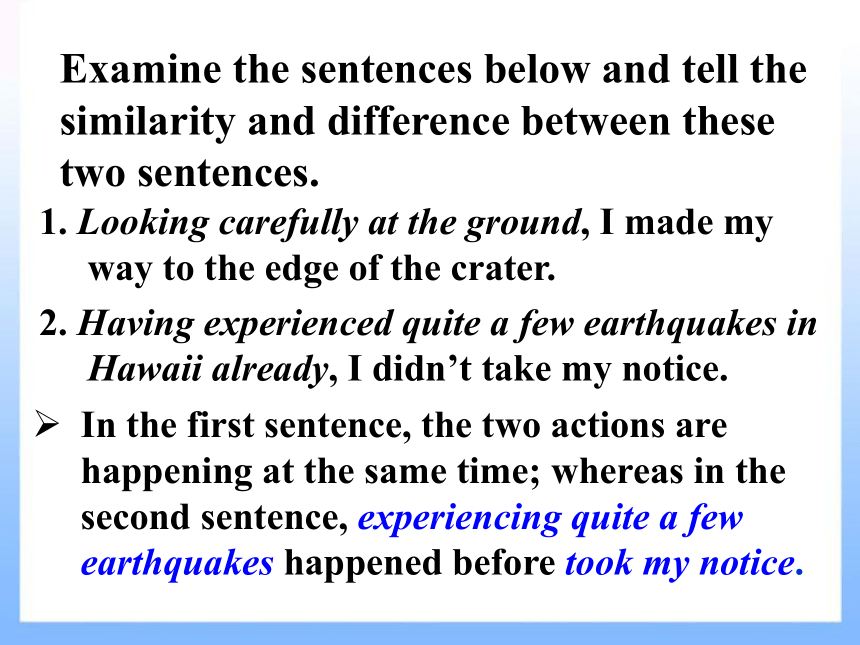

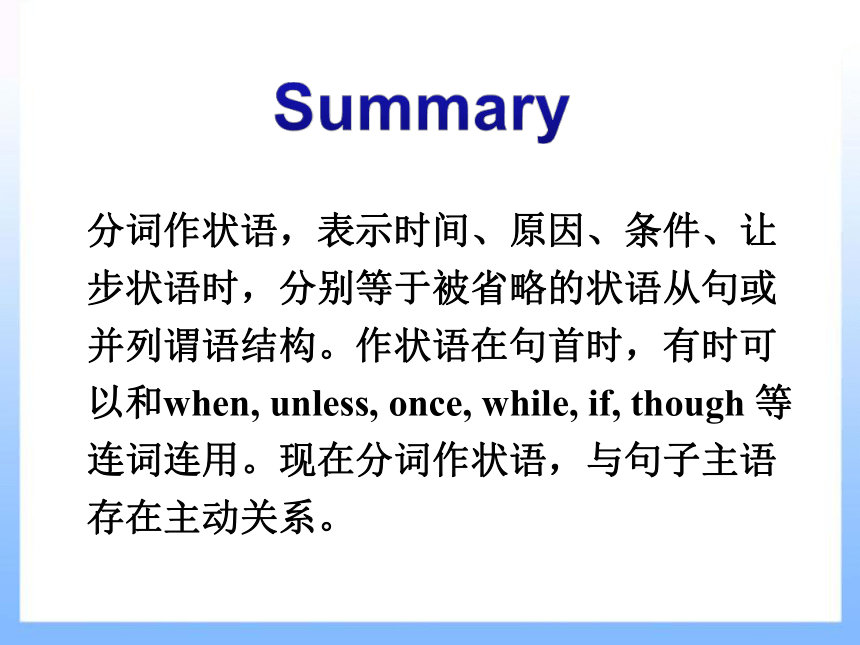
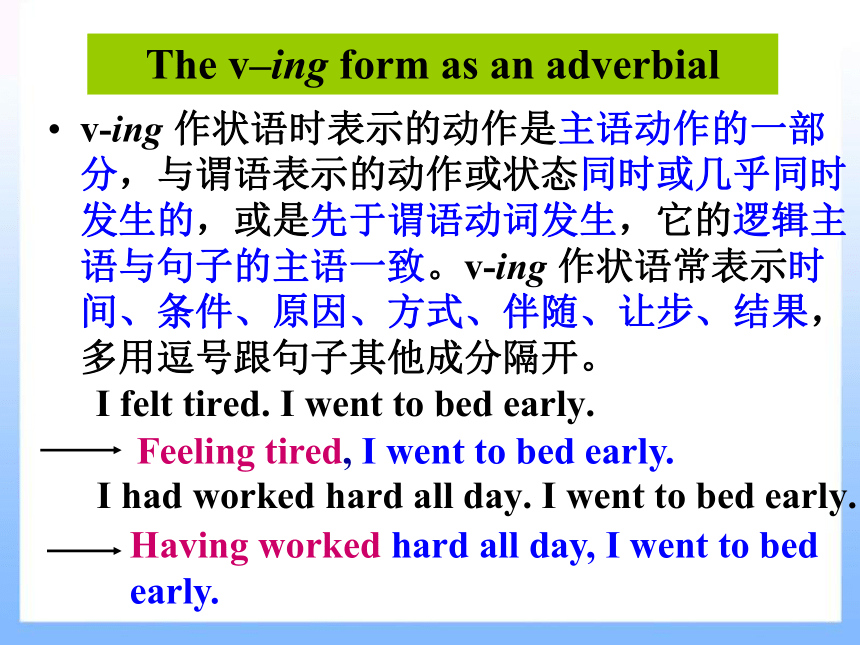
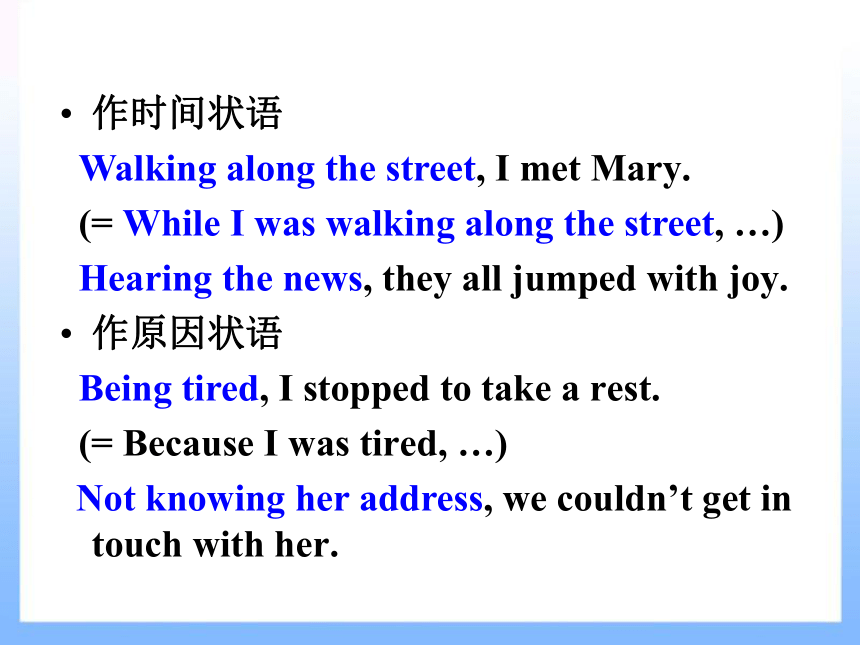
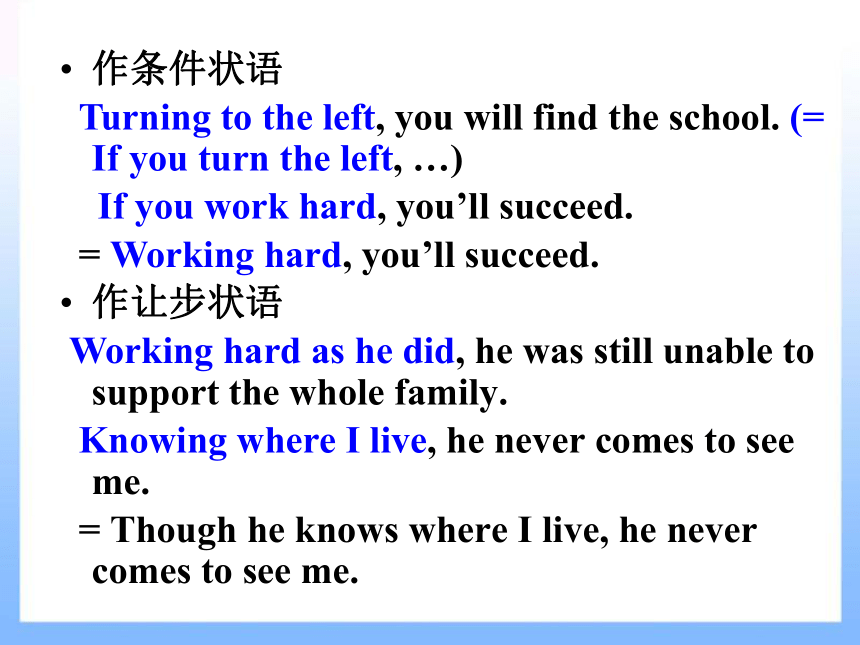
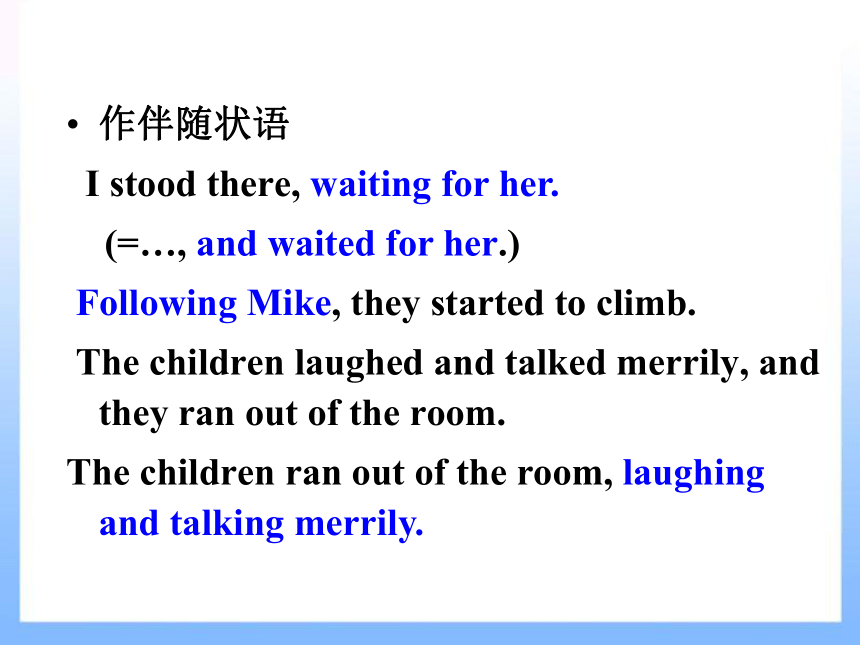
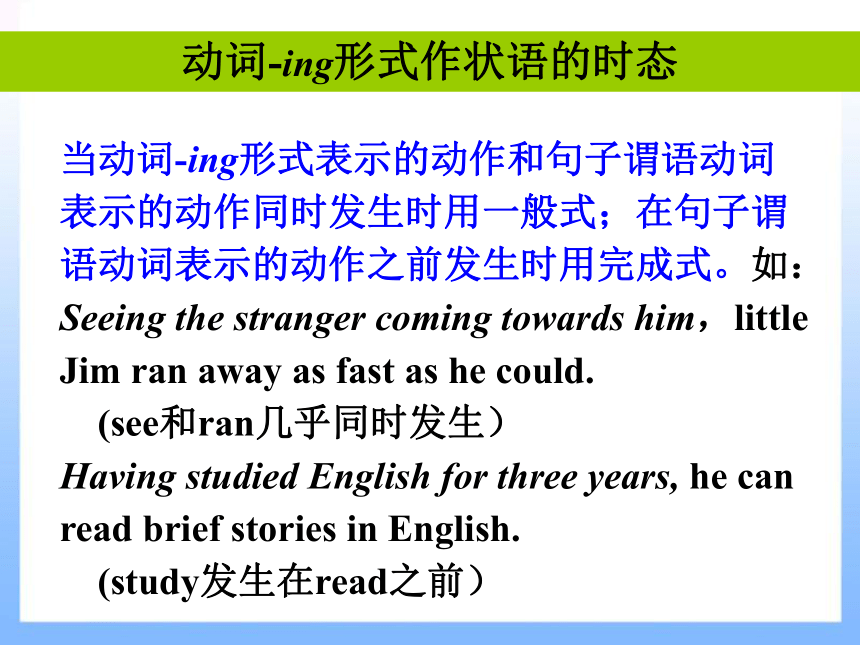
文档简介
(共29张PPT)
1. Looking carefully at the ground, I made my way to the edge of the crater.
2. Having experienced quite a few earthquakes in Hawaii already, I didn’t take my notice.
Examine the sentences below and tell the similarity and difference between these two sentences.
In the first sentence, the two actions are happening at the same time; whereas in the second sentence, experiencing quite a few earthquakes happened before took my notice.
1. Having collected and evaluated the information, I help other scientists …
2. Having worked hard all day, I went to bed early.
3. Having earlier collected special clothes from the observatory, we put them on before …
4. Having studied volcanoes now for many years, I am still …
More sentences in the reading passage.
分词作状语,表示时间、原因、条件、让步状语时,分别等于被省略的状语从句或并列谓语结构。作状语在句首时,有时可以和when, unless, once, while, if, though 等连词连用。现在分词作状语,与句子主语存在主动关系。
The v–ing form as an adverbial
v-ing 作状语时表示的动作是主语动作的一部分,与谓语表示的动作或状态同时或几乎同时发生的,或是先于谓语动词发生,它的逻辑主语与句子的主语一致。v-ing 作状语常表示时间、条件、原因、方式、伴随、让步、结果,多用逗号跟句子其他成分隔开。
I felt tired. I went to bed early.
I had worked hard all day. I went to bed early.
Feeling tired, I went to bed early.
Having worked hard all day, I went to bed early.
作时间状语
Walking along the street, I met Mary.
(= While I was walking along the street, …)
Hearing the news, they all jumped with joy.
作原因状语
Being tired, I stopped to take a rest.
(= Because I was tired, …)
Not knowing her address, we couldn’t get in touch with her.
作条件状语
Turning to the left, you will find the school. (= If you turn the left, …)
If you work hard, you’ll succeed.
= Working hard, you’ll succeed.
作让步状语
Working hard as he did, he was still unable to support the whole family.
Knowing where I live, he never comes to see me.
= Though he knows where I live, he never comes to see me.
作伴随状语
I stood there, waiting for her.
(=…, and waited for her.)
Following Mike, they started to climb.
The children laughed and talked merrily, and they ran out of the room.
The children ran out of the room, laughing and talking merrily.
当动词-ing形式表示的动作和句子谓语动词表示的动作同时发生时用一般式;在句子谓语动词表示的动作之前发生时用完成式。如:
Seeing the stranger coming towards him,little Jim ran away as fast as he could. (see和ran几乎同时发生)
Having studied English for three years, he can read brief stories in English. (study发生在read之前)
动词-ing形式作状语的时态
动词-ing 的完成式,即:
having +P.P(过去分词)…, 主语+谓语
1. After she had finished her work, she went home.
2. As we have invited him here to speak, we’d better go to his lecture.
Having finished her work, she went home.
Having invited him here to speak, we’d better go to his lecture.
当句子的主语执行动词-ing形式表示的动作时,动词-ing形式用主动式;当句子的主语承受动词-ing形式表示的动作时,动词-ing形式用被动式。如:
He listened to the tape, making notes now and then. (he执行make表示的动作)
Being called by a stranger, he realized what would happen. (he承受call表示的动作)
动词-ing形式作状语的语态
句子的主语既不执行也不承受动词-ing形式表示的动作时,就得给动词-ing形式加上它自己的逻辑主语,通常用普通格名词或主格代词充当。此时“逻辑主语 + 动词-ing形式”称为“独立结构”。如:
Her mother being ill, she had to ask for leave to take care of her. 由于母亲病了,她不得不请假照顾她。
动词-ing形式作状语的独立结构
当动词-ing形式作状语时,可与引导相应状语从句的连词连用,以明示属什么状语。
When landing on the island, they found some local people welcoming them. He moved his lips as if saying something.
2. 当动词-ing形式作方式状语时,可与by连用。
We learn a foreign language by correcting mistakes while using it.
连词与动词-ing形式短语连用
动词-ing形式的否定式是在其前面加not,如果它用了助动词构成完成式或被动式,就在助动词前面加not。如:
Not knowing his telephone number, I couldn’t ring him.
Not having been informed of the meeting, I failed to attend it.
动词-ing形式的否定式
有些v-ing短语已成为固定的惯用语,常被看作句子的插入语,常见的有:
generally speaking 一般说来
strictly / honestly / frankly / roughly / broadly / speaking
严格地/诚实地/坦白地/粗略地/泛泛地说
talking of / about .. 谈到…… considering…
考虑到……/鉴于……
judging from/ by… 根据……判断
taking all / everything into consideration 从 各方面考虑
allowing for… 考虑到
_____________ (approach) the city center, we saw a stone statue of about 10 meters in height.
解析:考察现在分词作状语,表示正在进行或主动的动作。此时分词的逻辑主语就是主句的主语,因此要注意人称、时态和语态的一致性。
[典型例题]
Approaching
2. He had a wonderful childhood, _____________ (travel) with his mother to all corners of the world
解析:主语(he)与动词travel之间存在主动关系,故用traveling作原因状语。
traveling
3. Dina, _____________ (struggle) for months to find a job as a waitress, finally took a position at a local advertising agency.
解析:该空是分词短语作时间状语,其逻辑主语Dina与struggle为主动关系。再由剧中的finally可知非谓语动词表示的动作发生在句中谓语took a position之前,故用现在分词的完成主动式。
having struggled
4. Sit down, Emma. You will only make yourself more tired, __________ (keep) on your feet.
解析:用现在分词表示一种条件,keep的动作是You发出的,二者之间没有动作的先后,所以不能用having kept。
keeping
5. Do you wake up every morning ___________ (feel) energetic and ready to start a new day?
解析:分析句子结构可知,此处为分词短语作为伴随状语,再根据主语you和feel的主动关系可知此处用现在分词短语,故正确答案为feeling。
feeling
6. Pressed from his parents, and _________ (realize) that he has wasted too much time, the boy is determined to stop playing video games.
解析:句子主语the boy 与realize 之间是主动关系,但时间不是表将来,所以答案为 realizing 。句意“感受到来自父母的压力,同时意识到自己浪费了很多时间,男孩子决心不再玩电脑游戏”。
realizing
7. There is no greater pleasure than lying on my back in the middle of the grassland, _________ (stare) at the night sky.
解析:考查非谓语动词。句意:躺在草坪的中央遥望着夜空,没有比这更快乐的事情了。此处staring作伴随状语,与隐含的主语(说话人)构成主动关系。
staring
Practice
running
1. “You can’t catch me!” Janet shouted, _________ (run) away.
2. The storm left, _____________ (cause) a lot of damage to this area.
3. ______________ (wait) in the queue for half an hour, Tom suddenly realized that he had left his wallet at home.
having caused
Having waited
Having suffered
4. __________________ (suffer) such heavy pollution already, it may now be too late to clean up the river.
5. The secretary worked all night long, __________ (prepare) a long speech for the president.
6. ____________________ (attempt) every approach she could think of, she finally solved the problem.
preparing
Having attempted
7. Those wild flowers look like a soft colorful blanket ___________ (cover) the hill.
8. ___________ (determine) to quit smoking, Mr. Wood threw away all his ___________ (remain) cigarettes.
9. This change was caused by both natural and human factors, with the human factors _________ (take) the lead.
covering
Determined
remaining
taking
如果时间允许,我会去看望我的老师。
2. 我们发现他躺在床上,听着MP3。
3. 通过讨论,我们找到了解决这道数学题的方法。
Time permitting, I’ll go to see my teacher.
We found him lying on the bed, listening to MP3.
We found the way to work out this math problem by discussing it.
Translate the sentences into English, using v-ing as adverbials.
4. 那位领导整夜未睡,考虑第二天做什么。
5. 挨了同学们的批评后,他不再去网吧打电子游戏了。
6. 过马路时要小心。
The leader stayed all the night, thinking of what to do the next day.
Having been criticized by his classmates, he didn’t go to the Internet bar to play computer games any more.
Be careful when crossing the street.??
1.?______________?the wrong bus, Martin found himself in an unfamiliar district. 2.?_______________ her opinion about protecting the environment, she left the meeting. 3.?________________?the precious necklace, she had no money left. 4.?______________?all day at home writing, the novelist went out for a walk in the evening. 5.? _____________?early for his date, Mark spent time reading the newspaper.
Complete the sentences with the v–ing form of the verbs: arrive, give, spend, take, and buy.
Having taken?
Having given
Having bought
Having spent?
Having arrived
Rewrite the sentences using the present or the
v–ing form of the underlined verbs. (P. 37 Ex. 3)
3. Waking up in the middle of the night, she saw her room was as bright as day.
4. Having stopped the car, we fond ourselves trapped in thick fog and couldn’t see clearly ahead.
5. Having spent all night reading the documents, I was very tired the next day.
6. Having never seen a rainbow before as a child, he was very excited.
1. Looking carefully at the ground, I made my way to the edge of the crater.
2. Having experienced quite a few earthquakes in Hawaii already, I didn’t take my notice.
Examine the sentences below and tell the similarity and difference between these two sentences.
In the first sentence, the two actions are happening at the same time; whereas in the second sentence, experiencing quite a few earthquakes happened before took my notice.
1. Having collected and evaluated the information, I help other scientists …
2. Having worked hard all day, I went to bed early.
3. Having earlier collected special clothes from the observatory, we put them on before …
4. Having studied volcanoes now for many years, I am still …
More sentences in the reading passage.
分词作状语,表示时间、原因、条件、让步状语时,分别等于被省略的状语从句或并列谓语结构。作状语在句首时,有时可以和when, unless, once, while, if, though 等连词连用。现在分词作状语,与句子主语存在主动关系。
The v–ing form as an adverbial
v-ing 作状语时表示的动作是主语动作的一部分,与谓语表示的动作或状态同时或几乎同时发生的,或是先于谓语动词发生,它的逻辑主语与句子的主语一致。v-ing 作状语常表示时间、条件、原因、方式、伴随、让步、结果,多用逗号跟句子其他成分隔开。
I felt tired. I went to bed early.
I had worked hard all day. I went to bed early.
Feeling tired, I went to bed early.
Having worked hard all day, I went to bed early.
作时间状语
Walking along the street, I met Mary.
(= While I was walking along the street, …)
Hearing the news, they all jumped with joy.
作原因状语
Being tired, I stopped to take a rest.
(= Because I was tired, …)
Not knowing her address, we couldn’t get in touch with her.
作条件状语
Turning to the left, you will find the school. (= If you turn the left, …)
If you work hard, you’ll succeed.
= Working hard, you’ll succeed.
作让步状语
Working hard as he did, he was still unable to support the whole family.
Knowing where I live, he never comes to see me.
= Though he knows where I live, he never comes to see me.
作伴随状语
I stood there, waiting for her.
(=…, and waited for her.)
Following Mike, they started to climb.
The children laughed and talked merrily, and they ran out of the room.
The children ran out of the room, laughing and talking merrily.
当动词-ing形式表示的动作和句子谓语动词表示的动作同时发生时用一般式;在句子谓语动词表示的动作之前发生时用完成式。如:
Seeing the stranger coming towards him,little Jim ran away as fast as he could. (see和ran几乎同时发生)
Having studied English for three years, he can read brief stories in English. (study发生在read之前)
动词-ing形式作状语的时态
动词-ing 的完成式,即:
having +P.P(过去分词)…, 主语+谓语
1. After she had finished her work, she went home.
2. As we have invited him here to speak, we’d better go to his lecture.
Having finished her work, she went home.
Having invited him here to speak, we’d better go to his lecture.
当句子的主语执行动词-ing形式表示的动作时,动词-ing形式用主动式;当句子的主语承受动词-ing形式表示的动作时,动词-ing形式用被动式。如:
He listened to the tape, making notes now and then. (he执行make表示的动作)
Being called by a stranger, he realized what would happen. (he承受call表示的动作)
动词-ing形式作状语的语态
句子的主语既不执行也不承受动词-ing形式表示的动作时,就得给动词-ing形式加上它自己的逻辑主语,通常用普通格名词或主格代词充当。此时“逻辑主语 + 动词-ing形式”称为“独立结构”。如:
Her mother being ill, she had to ask for leave to take care of her. 由于母亲病了,她不得不请假照顾她。
动词-ing形式作状语的独立结构
当动词-ing形式作状语时,可与引导相应状语从句的连词连用,以明示属什么状语。
When landing on the island, they found some local people welcoming them. He moved his lips as if saying something.
2. 当动词-ing形式作方式状语时,可与by连用。
We learn a foreign language by correcting mistakes while using it.
连词与动词-ing形式短语连用
动词-ing形式的否定式是在其前面加not,如果它用了助动词构成完成式或被动式,就在助动词前面加not。如:
Not knowing his telephone number, I couldn’t ring him.
Not having been informed of the meeting, I failed to attend it.
动词-ing形式的否定式
有些v-ing短语已成为固定的惯用语,常被看作句子的插入语,常见的有:
generally speaking 一般说来
strictly / honestly / frankly / roughly / broadly / speaking
严格地/诚实地/坦白地/粗略地/泛泛地说
talking of / about .. 谈到…… considering…
考虑到……/鉴于……
judging from/ by… 根据……判断
taking all / everything into consideration 从 各方面考虑
allowing for… 考虑到
_____________ (approach) the city center, we saw a stone statue of about 10 meters in height.
解析:考察现在分词作状语,表示正在进行或主动的动作。此时分词的逻辑主语就是主句的主语,因此要注意人称、时态和语态的一致性。
[典型例题]
Approaching
2. He had a wonderful childhood, _____________ (travel) with his mother to all corners of the world
解析:主语(he)与动词travel之间存在主动关系,故用traveling作原因状语。
traveling
3. Dina, _____________ (struggle) for months to find a job as a waitress, finally took a position at a local advertising agency.
解析:该空是分词短语作时间状语,其逻辑主语Dina与struggle为主动关系。再由剧中的finally可知非谓语动词表示的动作发生在句中谓语took a position之前,故用现在分词的完成主动式。
having struggled
4. Sit down, Emma. You will only make yourself more tired, __________ (keep) on your feet.
解析:用现在分词表示一种条件,keep的动作是You发出的,二者之间没有动作的先后,所以不能用having kept。
keeping
5. Do you wake up every morning ___________ (feel) energetic and ready to start a new day?
解析:分析句子结构可知,此处为分词短语作为伴随状语,再根据主语you和feel的主动关系可知此处用现在分词短语,故正确答案为feeling。
feeling
6. Pressed from his parents, and _________ (realize) that he has wasted too much time, the boy is determined to stop playing video games.
解析:句子主语the boy 与realize 之间是主动关系,但时间不是表将来,所以答案为 realizing 。句意“感受到来自父母的压力,同时意识到自己浪费了很多时间,男孩子决心不再玩电脑游戏”。
realizing
7. There is no greater pleasure than lying on my back in the middle of the grassland, _________ (stare) at the night sky.
解析:考查非谓语动词。句意:躺在草坪的中央遥望着夜空,没有比这更快乐的事情了。此处staring作伴随状语,与隐含的主语(说话人)构成主动关系。
staring
Practice
running
1. “You can’t catch me!” Janet shouted, _________ (run) away.
2. The storm left, _____________ (cause) a lot of damage to this area.
3. ______________ (wait) in the queue for half an hour, Tom suddenly realized that he had left his wallet at home.
having caused
Having waited
Having suffered
4. __________________ (suffer) such heavy pollution already, it may now be too late to clean up the river.
5. The secretary worked all night long, __________ (prepare) a long speech for the president.
6. ____________________ (attempt) every approach she could think of, she finally solved the problem.
preparing
Having attempted
7. Those wild flowers look like a soft colorful blanket ___________ (cover) the hill.
8. ___________ (determine) to quit smoking, Mr. Wood threw away all his ___________ (remain) cigarettes.
9. This change was caused by both natural and human factors, with the human factors _________ (take) the lead.
covering
Determined
remaining
taking
如果时间允许,我会去看望我的老师。
2. 我们发现他躺在床上,听着MP3。
3. 通过讨论,我们找到了解决这道数学题的方法。
Time permitting, I’ll go to see my teacher.
We found him lying on the bed, listening to MP3.
We found the way to work out this math problem by discussing it.
Translate the sentences into English, using v-ing as adverbials.
4. 那位领导整夜未睡,考虑第二天做什么。
5. 挨了同学们的批评后,他不再去网吧打电子游戏了。
6. 过马路时要小心。
The leader stayed all the night, thinking of what to do the next day.
Having been criticized by his classmates, he didn’t go to the Internet bar to play computer games any more.
Be careful when crossing the street.??
1.?______________?the wrong bus, Martin found himself in an unfamiliar district. 2.?_______________ her opinion about protecting the environment, she left the meeting. 3.?________________?the precious necklace, she had no money left. 4.?______________?all day at home writing, the novelist went out for a walk in the evening. 5.? _____________?early for his date, Mark spent time reading the newspaper.
Complete the sentences with the v–ing form of the verbs: arrive, give, spend, take, and buy.
Having taken?
Having given
Having bought
Having spent?
Having arrived
Rewrite the sentences using the present or the
v–ing form of the underlined verbs. (P. 37 Ex. 3)
3. Waking up in the middle of the night, she saw her room was as bright as day.
4. Having stopped the car, we fond ourselves trapped in thick fog and couldn’t see clearly ahead.
5. Having spent all night reading the documents, I was very tired the next day.
6. Having never seen a rainbow before as a child, he was very excited.
